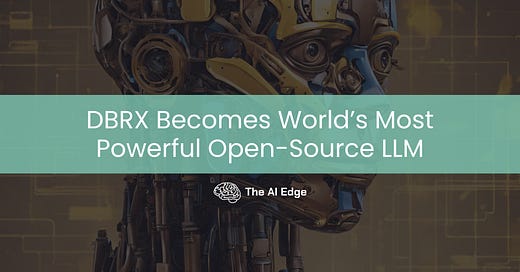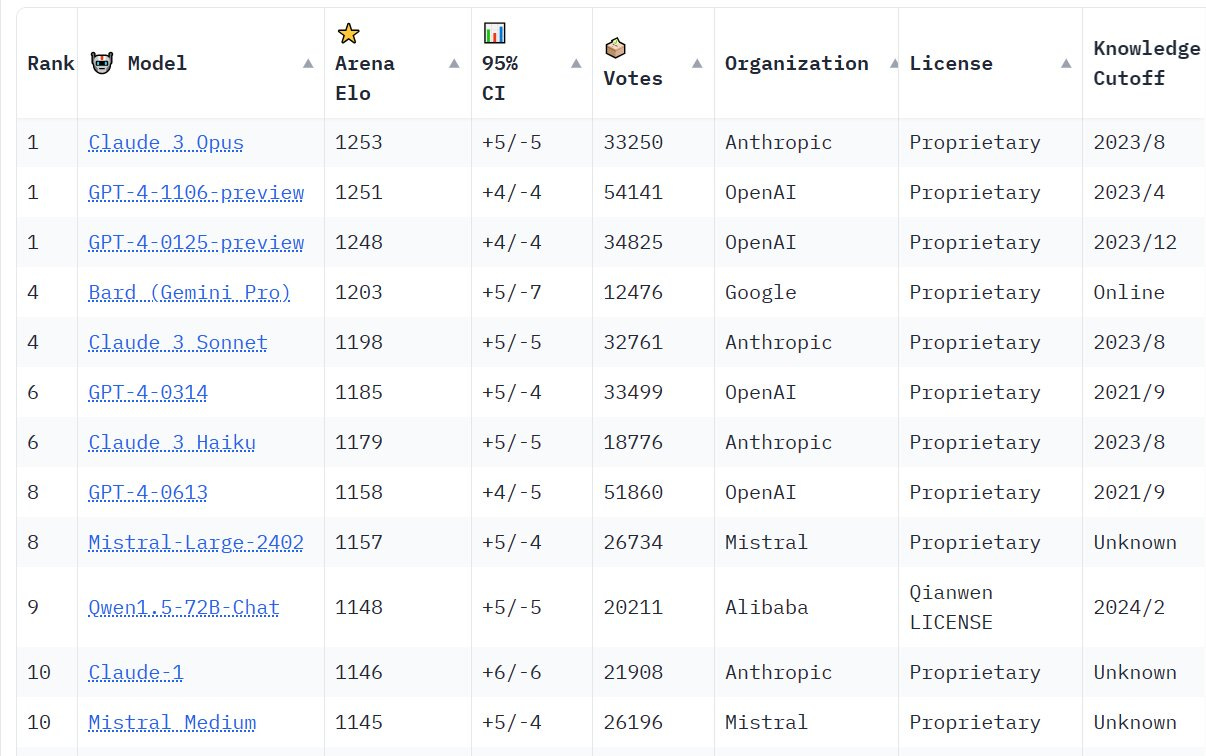DBRX Becomes World’s Most Powerful Open Source LLM
Plus: Claude 3 Opus crowned the top user-rated chatbot, Hume AI's EVI redefines voice interaction
Hello Engineering Leaders and AI Enthusiasts!
Welcome to the 241st edition of The AI Edge newsletter. This edition brings you details on DBRX, the world’s most powerful open-source LLM.
And a huge shoutout to our incredible readers. We appreciate you😊
In today’s edition:
⚡ DBRX becomes world’s most powerful open-source LLM
.
🏆 Claude 3 Opus crowned the top user-rated chatbot, beating OpenAI’s GPT-4
💙 Empathy meets AI: Hume AI's EVI redefines voice interaction
💡 Knowledge Nugget: Embracing Generative AI: The Dawn of a New E-commerce Experience by
Let’s go!
DBRX becomes world’s most powerful open source LLM
Databricks has released DBRX, a family of open-source large language models setting a new standard for performance and efficiency. The series includes DBRX Base and DBRX Instruct, a fine-tuned version designed for few-turn interactions. Developed by Databricks' Mosaic AI team and trained using NVIDIA DGX Cloud, these models leverage an optimized mixture-of-experts (MoE) architecture based on the MegaBlocks open-source project. This architecture allows DBRX to achieve up to twice the compute efficiency of other leading LLMs.
In terms of performance, DBRX outperforms open-source models like Llama 2 70B, Mixtral-8x7B, and Grok-1 on industry benchmarks for language understanding, programming, and math. It also surpasses GPT-3.5 on most of these benchmarks, although it still lags behind GPT-4. DBRX is available under an open license with some restrictions and can be accessed through GitHub, Hugging Face, and major cloud platforms. Organizations can also leverage DBRX within Databricks' Data Intelligence Platform.
Why does this matter?
With DBRX, organizations can build and fine-tune powerful proprietary models using their own internal datasets, ensuring full control over their data rights. As a result, DBRX is likely to accelerate the trend of organizations moving away from closed models and embracing open alternatives that offer greater control and customization possibilities.
Claude 3 Opus crowned the top user-rated chatbot, beating OpenAI’s GPT-4
Anthropic's Claude 3 Opus has overtaken OpenAI's GPT-4 to become the top-rated chatbot on the Chatbot Arena leaderboard. This marks the first time in approximately a year since GPT-4's release that another language model has surpassed it in this benchmark, which ranks models based on user preferences in randomized head-to-head comparisons. Anthropic's cheaper Haiku and mid-range Sonnet models also perform impressively, coming close to the original GPT-4's capabilities at a significantly lower cost.
While OpenAI still dominates the market, especially among regular users with ChatGPT, this development and recent leadership changes at OpenAI have helped Anthropic gain ground. However, OpenAI is rumored to be preparing to launch an even more advanced "GPT-4.5" or "GPT-5" model as soon as this summer, which CEO Sam Altman has teased will be "amazing,” potentially allowing them to retake the lead from Anthropic's Claude 3 Opus.
Why does this matter?
Claude's rise to the top of the Chatbot Arena leaderboard shows that OpenAI is not invincible and will face stiff competition in the battle for AI supremacy. With well-resourced challengers like Anthropic and Google, OpenAI will need to move fast and innovate boldly to maintain its top position. Ultimately, this rivalry will benefit everyone as it catalyzes the development of more powerful, capable, and hopefully beneficial AI systems that can help solve humanity's major challenges.
Empathy meets AI: Hume AI's EVI redefines voice interaction
In a significant development for the AI community, Hume AI has introduced a new conversational AI called Empathic Voice Interface (EVI). What sets EVI apart from other voice interfaces is its ability to understand and respond to the user's tone of voice, adding unprecedented emotional intelligence to the interaction. By adapting its language and responses based on the user's expressions, EVI creates a more human-like experience, blurring the lines between artificial and emotional intelligence.
EVI's empathic capabilities extend beyond just understanding tone. It can accurately detect the end of a conversation turn, handle interruptions seamlessly, and even learn from user reactions to improve over time. These features, along with its fast and reliable transcription and text-to-speech capabilities, make EVI a highly adaptable tool for various applications. Developers can easily integrate EVI into their projects using Hume's API, which will be publicly available in April.
Why does this matter?
Emotionally intelligent AI can be revolutionary for industries like healthcare and use cases like customer support, where empathy and emotional understanding are crucial. But we must also consider potential risks, such as overreliance on AI for emotional support or the possibility of AI systems influencing users' emotions in unintended ways. If developed and implemented ethically, emotionally intelligent AI can greatly enhance how we interact with and benefit from AI technologies in our daily lives.
Enjoying the daily updates?
Refer your pals to subscribe to our daily newsletter and get exclusive access to 400+ game-changing AI tools.
When you use the referral link above or the “Share” button on any post, you'll get the credit for any new subscribers. All you need to do is send the link via text or email or share it on social media with friends.
Knowledge Nugget: Embracing Generative AI: The Dawn of a New E-commerce Experience
In his collaborative article,
explores how generative AI and LLMs are set to transform the e-commerce industry. By processing multimodal data like text, images, video, and voice, generative AI will enable highly interactive, personalized shopping experiences that captivate and inspire users.According to Wang, the future e-commerce landscape will be shaped by tech giants extending their AI platforms to e-commerce, vertical vendors using AI to generate specialized niche content, and traditional e-commerce companies using AI to enhance user experiences, logistics, and customer support. To succeed, e-commerce companies should focus on using generative AI to enrich their proprietary data, improve personalization, and build robust AI infrastructure - not just chase the latest innovations from AI leaders.
Why does this matter?
As Wang highlights, companies that use AI to enrich their proprietary data and personalize customer interactions will gain a significant competitive edge. This will likely widen the gap between e-commerce leaders and laggards, as businesses that fail to adapt risk being left behind. In the coming years, the most successful online retailers will be those that use AI to anticipate customer needs and deliver unparalleled shopping experiences.
What Else Is Happening❗
💰 OpenAI launches revenue sharing program for GPT Store builders
OpenAI is experimenting with sharing revenue with builders who create successful apps using GPT in OpenAI's GPT Store. The goal is to incentivize creativity and collaboration by rewarding builders for their impact on an ecosystem OpenAI is testing so they can make it easy for anyone to build and monetize AI-powered apps. (Link)
🛍️ Google introduces new shopping features to refine searches
Google is rolling out new shopping features that allow users to refine their searches and find items they like more easily. The Style Recommendations feature lets shoppers rate items in their searches, helping Google pick up on their preferences. Users can also specify their favorite brands to instantly bring up more apparel from those selections. (Link)
🗣️ rabbit's r1 device gets ultra-realistic voice powered by ElevenLabs
ElevenLabs has partnered with rabbit to integrate its high-quality, low-latency voice AI into rabbit's r1 AI companion device. The collaboration aims to make the user experience with r1 more natural and intuitive by allowing users to interact with the device using voice commands. (Link)
💸 AI startup Hume raises $50M to build emotionally intelligent conversational AI
AI startup Hume has raised $50 million in a Series B funding round, valuing the company at $219 million. Hume's AI technology can detect over 24 distinct emotional expressions in human speech and generate appropriate responses. The startup's AI has been integrated into applications across healthcare, customer service, and productivity, with the goal of providing more context and empathy in AI interactions. (Link)
💻 Lenovo launches AI-enhanced PCs in a push for innovation and differentiation
Lenovo revealed a new lineup of AI-powered PCs and laptops at its Innovate event in Bangkok, Thailand. The company showcased the dual-screen Yoga Book 9i, Yoga Pro 9i with an AI chip for performance optimization and AI-enhanced Legion gaming laptops. Lenovo hopes to differentiate itself in the crowded PC market and revive excitement with these AI-driven innovations. (Link)
New to the newsletter?
The AI Edge keeps engineering leaders & AI enthusiasts like you on the cutting edge of AI. From ML to ChatGPT to generative AI and LLMs, We break down the latest AI developments and how you can apply them in your work.
Thanks for reading, and see you tomorrow. 😊





